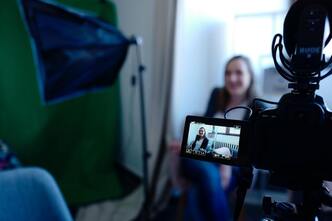
Captain Jean-Luc Picard, the wise and fearless commander of the starship Enterprise, has vanquished countless alien foes. So it’s surprising to see a news reporter finally take him down.
Thus goes a powerful and uncomfortable scene in the new CBS All-Access series, Star Trek: Picard. And it’s a moment from which all good communicators can learn.
The show follows the titular hero, played by Sir Patrick Stewart, decades after his adventures in the television series Star Trek: The Next Generation. Picard gave up his life in Starfleet after a terrorist attack quashed a rescue mission he was coordinating. Years later, agreeing to his first-ever live TV interview, Picard abruptly loses his temper under a reporter’s tough questions, accusing Starfleet of turning its back on people in need.
As I watched the scene unfold, it was clear even before he sat down for the interview that Picard was wholly unprepared. He wasn’t sure what he would be asked or what he would say; perhaps overly confident after a career of facing galactic threats, Picard seemed content to just wing it.
Lack of preparation before a media interview isn’t just a problem for future starship captains. Too many leaders today think that being comfortable in an employee meeting or an investor presentation fully equips them for a news interview. Even some PR people don’t think take media opportunities as seriously as they should. That puts organizations and brands at risk.
Here’s what Picard’s failure can teach us today:
- Prepare for every interview. The captain’s humiliation was his own fault. In failing to prepare, he did a disservice to himself, the reporter and her audience. Yes, she purposely goaded him, but he lost his temper because he wasn’t ready for a question that any good reporter would (and did) ask. He should have anticipated it and had his response ready.
- Own the interview. In the scene, Picard ceded control of the interview almost entirely to the reporter. When I conduct media training, I show people how they can deliver their messages effectively while still acknowledging the question and honoring the reporter. Remember, a media interview isn’t a court of law; the interviewer can’t make you say anything you don’t want to say.
- Say what you want to say, how you want to say it. Perhaps Picard welcomed the opportunity to call out Starfleet. But he didn’t come across as prepared and focused; he came across as angry. Rarely, a little righteous anger can augment a message, but usually it just obscures it. People remember the rage rather than the point. Stay cool, have your messages ready, and deliver them often.
- Don’t walk out. Storming out of an interview isn’t a win. When Picard did it, he looked like he was ill-equipped, a little petulant and a whole lot embarrassed. Walking out is almost never the right play; it sends a message that you have something to hide. Now, if a reporter has been completely deceitful, then I might reluctantly support a walkout. But contrary to TV dramas, ethical reporters don’t work that way. If you get a question or topic you weren’t expecting, and it’s legitimate and relevant to you and your work, the responsibility is on you. Answer the question, or explain why you can’t, and circle back to your message points.
The rest of the episode shows the good captain embracing a mystery and renewing his commitment to doing things good and right. Star Trek: Picard promises to be a fun and thought-provoking series. Let’s hope Jean-Luc's next encounter with the news media is one for which he’s fully prepared.

 RSS Feed
RSS Feed
